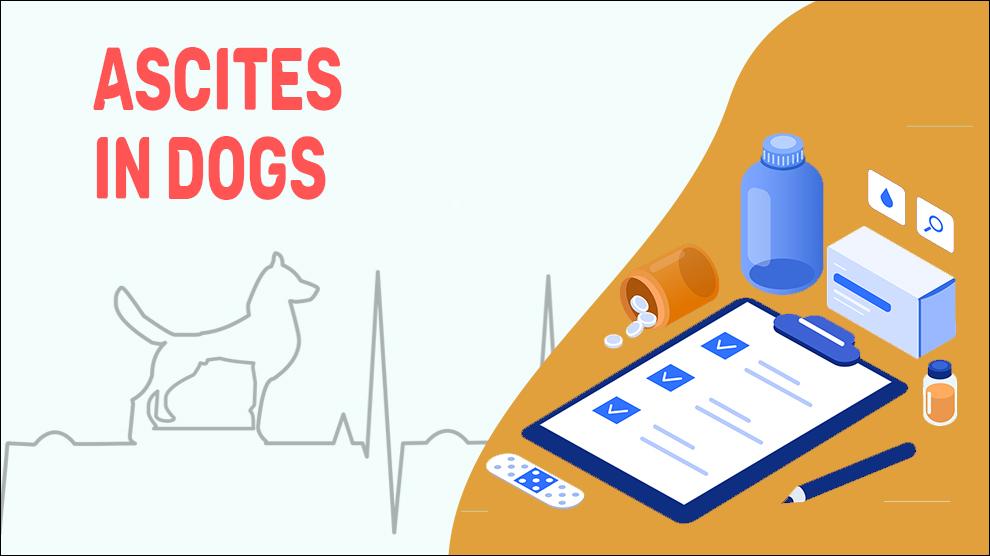What is Ascites In Dogs?
Ascites in dogs are an abnormal buildup of fluid in the abdomen. There are many possible medical conditions in dogs that would cause such an accumulation of fluids, and although it can be taken care of successfully, it’s prone to return if the underlying condition remains.
The word “ascites” could be used interchangeably with other terms such as abdominal effusion, abdominal dropsy, hydroperitoneum, peritoneal cavity fluid, and peritoneal fluid excess.
Though ascites are typically a clinical manifestation of another possibly serious issue, they can also bring symptoms of their own.
Ascites clinical signs can be either covered and/or aggravated by the signs resulting from the underlying cause of the ascites. For instance, a dog with heart disease and ascites will have dyspnea and exercise intolerance, both from the heart disease and ascites.
If you see the symptoms in your dog, you must consult your veterinarian as it needs to be investigated immediately to identify and treat the underlying condition.
Symptoms Of Ascites In Dogs
- Abdominal Distension
- Pale Or Bluish Gums
- Anorexia
- Lethargy
- Vomiting
- Weight Gain
- Exercise Intolerance
- Difficulty Breathing (Or Dyspnea), Excessive Panting
- Anemia
- Groaning Noises When Lying Down
- Buildup Of Fluid In The Scrotum (male dogs)
Treatment Options For Ascites In Dogs
A definitive diagnosis of the underlying cause of ascites must be done.
These initial tests should be considered:
- Biochemical profile
- complete blood test (CBC)
- Chest and abdominal x-rays
- Urinalysis
- peritoneal lavage or Abdominocentesis with fluid analysis and culture
Further diagnostics tests might include:
- Serum lipase
- Bile acid measurements
- Abdominal ultrasound and ultrasound-guided biopsies
- Endoscopy
- Echocardiogram
Treatment of Ascites in Dogs
The aim of Ascites treatment is symptomatically address the underlying cause of the condition. Efforts are geared towards preventing the progression of ascites and relieving manifested symptoms.
- Therapeutic abdominocentesis - when the amount of abdominal distention is compromising the dog’s ability to breathe, the excess from the abdomen will be removed).
- Diuretics (like Spironolactone, Furosemide, torsemide, and bumetanide) to promote fluid excretion.
- Intravenous fluids in cases of shock or dehydration.
- Antihypertensive medications- metolazone (Mykron, Zaroxolyn), Mannitol (Osmitrol).
- Antibiotic medications if the infection is suspected.
Home Remedies For Ascites
Discuss with veterinarian for any home care specific to your dog’s situation.
This may include dietary changes, exercise, further medications to administer and future veterinary visits for treatments as needed.
How to Prevent Ascites In Dogs?
- Start a nutritionally sound diet early
- Exercise your dog the right way
- Regular visits to the vet including yearly once comprehensive examination
- Ask your veterinarian about gastrointestinal supplements
- Maintain your dog’s optimal weight
Affected Dog Breeds Of Ascites
There is no breed disposition
High incidence: middle-aged dogs
However, it is most represented in
Labrador retriever, Pomeranian, Boxer, Doberman pinscher
Additional Facts For Ascites In Dogs
- The abnormal fluid buildup within a canine’s abdomen may be:
- Bile: Greenish-yellow fluid that aids with digestion of fats.
- Blood
- Urine
- Chyle: Milky fluid from emulsified fats of lymphatic fluid.
- Exudate: Fluid that is rich in protein discharged from tissue or capillaries when inflammation is present.
- Transudate: Watery low protein fluid transudes via a membrane, pore, or interstice.
- Causes:
- Ascites are classified generally into pre-hepatic, hepatic, and post-hepatic origin.
- Pre-hepatic Causes: Bacterial infection such as tuberculosis, portal vein thrombosis, hypoalbuminemia, malnutrition, and parasitic diseases such as entamoeba, strongyloidosis.
- Post-hepatic Causes: Left-sided heart failure, right-sided heart failure, and congestive heart failure are often linked with pulmonary hypertension, constrictive pericarditis, etc.
- Hepatic Origin: Cirrhosis, hepatitis, and portal hypertension.
When To See A Vet For Ascites In Dogs?
Generally the diagnosis of ascites could be confusing considering the multitude of diseases implicated in the condition. Treatment of ascites is reliant on proper detection of the cause of ascites. It clearly reveals that ascites is only treatable when the cause is properly diagnosed. So when you suspect something is not right, visit vet for further clarifications.
Dog Food Suggestions For Ascites
Foods to avoid:
- Spicy foods, Greasy, fatty, and fried foods, and Allergens (gluten, soy, and dairy)
- Eliminate colorings, preservatives, additives, and flavors from your pet’s diet
- Avoid Late-night feedings
What to feed?
Lean boiled meats
Chicken baby food
Cottage cheese and yogurt
Fiber-rich foods: Apples, pears, oatmeal, and other foods
vitamin A: spinach, cantaloupe, carrots, and beef liver
Vitamin c: red bell pepper, strawberries, kiwis, etc
Homemade bland diet for ascites
- Chicken breast or ground beef or turkey breast
- Cook rice and meat separately and mix on a 50/50 ratio
- Serve in 70/30 proportions
Conclusion
Ascites Treatment is centered on the effective diagnosis of the aetiology.
Ascites in your dog can be reduced and managed with concurrent treatments.
However, recuperation will eventually depend on the success of treatments for the underlying condition.
Asscites may be resolved, but when the original problem is not, the ascites may return.

















